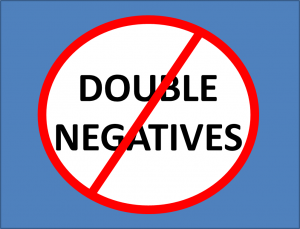Double negatives are a no-no
 When you hear double negative, do you think of a country bumpkin who says “I ain’t got no …” and “It don’t make me no nevermind?” You might be surprised to know how many people think they’re using a classier form of double negative to sound smart.
When you hear double negative, do you think of a country bumpkin who says “I ain’t got no …” and “It don’t make me no nevermind?” You might be surprised to know how many people think they’re using a classier form of double negative to sound smart.
Or—wait a minute—maybe it’s to avoid saying something else. Something that would be clearer if stated positively.
The worst examples, ballot propositions, contain so many switchbacks that voters can’t figure out whether they’re for or against them. “Vote yes to prevent restriction on limitations of the governor’s ability to veto any measure that blocks a moratorium on non-voter-approved prohibitions …” No wonder voters avoid the polls in off-year elections!
Grammatically correct double negatives raise more questions than they answer. That’s why people in certain lines of work lawyers and politicians use them. But real people use them too. Consider these examples:
She’s not unattractive, unintelligent, or unsophisticated.
Does that mean she is attractive, intelligent, and sophisticated? Or just that she’s not completely ugly, stupid, and common? There’s a huge gray area between those two possibilities. Would you rather the man in your life described you as beautiful or not totally hideous?
I’m not opposed to the idea…
So, does that mean you’re for it? Would you stand by and watch it happen, vote for it, or support it? Would you approve funding for it?
I didn’t say I would not consider …
But you also didn’t say you would. And the fact that you didn’t say it means nothing.
It is not incorrect to assume that …
Not-wrong does not always equal right, just as not guilty doesn’t necessarily mean innocent. Many jurors have said, after a not guilty verdict, “We all think he did it. There just wasn’t enough evidence to put him away for life.”
Everyone indulges in wishful thinking and denial. We believe the best in people and we want positive outcomes. So when we hear two no expressions that seem to cancel each other, we’re all too eager to accept it as a yes. But maybe it’s just a slimy way for the speaker to not exactly say yes. It leaves the door open for back-pedaling later, as in ,”What I actually said was …”
Beware of these self-cancelling double negatives in business negotiations and personal exchanges. If you encounter one in an important discussion, ask for a restatement in positive terms. The speaker will either commit to a positive stance or change the subject. If he refuses to let the statement be clarified, you have your answer. How would you interpret this conversation?
John: Marsha, you’re the love of my life. Will you marry me?
Marsha: John, you know I’m nothing if not fond of you. Our time together has not been unpleasant. The idea of spending my life with you is not disagreeable, and I’m not saying I wouldn’t like to do that. Our attraction is not unlike that of Romeo and Juliet. When people say we’re not meant for each other, I never fail to disagree with them. It would not be incorrect to say that I am not opposed to the idea.
John—old buddy—if you think that’s a yes, I hope you kept the receipt for the ring.
Like TextCPR on Facebook!



